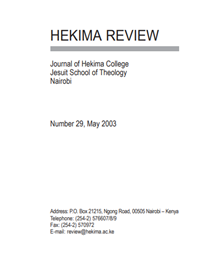Archives - Page 5
-
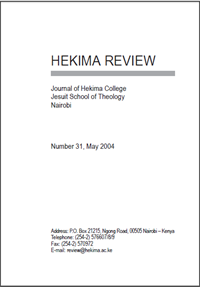
Hekima Review No. 31 (May 2004)
In the 30th issue of the HR, my predecessor, Edoth Mukasa SJ noted that 20 years after the foundation of Hekima College, “the College has come of age.” For many, coming of age or maturity is characterized by independence and responsible service to the community.
As if to assert her maturity, during her 20th academic year, Hekima was weaned of her remaining founding member of the faculty. The departure of Fr Edmond Murphy, who had served the college for 20 years, and was not only the longest-serving member of staff but also the only remaining member of the original founding team of the college, ushered in a new era in the annals of the college. As Fr Eddie noted
during his farewell liturgy at her 20th anniversary, the college had matured from the foundational idea of building a theologate in Africa to that of being a truly African theologate rooted in the African context. -

Hekima Review No. 30 (Dec 2003)
Founded in 1984, Hekima College has just stepped into its twentieth year. Twenty years later… the College has come of age. An institution committed to training men and women for others, in the tradition of the Society of Jesus, Hekima College has been the Alma Mater of many African Jesuits and other religious men and women now labouring in the vineyard of the Lord, in service of Christ’s mission. The very year in which Hekima College enters its twentieth anniversary, the Jesuits of Africa and Madagascar open a second Jesuit School of Theology in Abidjan, Côte d’Ivoire. It is hoped that this new School will follow in the footsteps of Hekima College and, Deo volente, come of age even earlier!
-
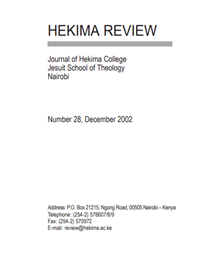
Hekima Review No. 28 (Dec 2002)
The last eleven months of this year have given us a mixed bag of hope and despair in Africa. One conference followed the other, in or about Africa and its plight in the fast-changing world. Whatever causes are put forward for the ragbag of Africa’s hope as well as despair, one conclusion is that the reason we hold so tightly to hope is that we face so many challenges in our continent. Civil conflicts are still razing down thousands of lives daily. HIV/AIDS is ravaging the most productive segment of our population. The effects of the coup d’état in La Côte d’Ivoire are unresolved as we go to press. One could go on and on with the problems, but there are also many encouraging signs emerging. For instance, in July this year, the fifty-four heads of African countries cloned an African Union (AU) out of the beleaguered Organisation of Africa Unity (OAU).
-
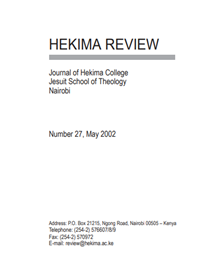
Hekima Review No. 27 (May 2002)
The biggest riddle of Africa is its political situation. Over the last three decades, our continent’s preoccupation with the process of democratization has only had marginal success. At the onset of this third millennium, the call urging African countries to democratize is coming both from within and from without. In our time, to subscribe to democracy as a form of government is to appeal for national renewal and global deference. However, a cursory glance at the continent’s political history shows that two opposing forces are at work: on the part of the majority, goodwill to change the situation, and on the part of others, unwillingness to tamper with the status quo. The weight of the inertia has, of course, been exacerbated by the absence of regard for the promotion of justice and by fanatical intolerance towards dissenting voices. The assumption is easily made that the democratization process is itself a response to the political riddle, which taunts Africa and its people.
-
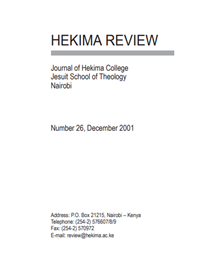
Hekima Review No. 26 (Dec 2001)
From the fertile soil of Africa, the Hekima tree of theology continues to absorb its nutrients. Now matured and ripe from that tree are the fruits offered to you in this issue of Hekima Review. It is a basket of ten articles, six book reviews, and a poem on the HIV/AIDS situation in Africa. This assortment of articles has as its essential focus ‘The Relevance of Theology in Africa Today’. Like the trained scribe of Matthew (13:52), we draw from the old harvest of the last Hekima Theological Week of January this year. From that treasure, we present in our SYMPOSIUM COLUMN the reflections of two renowned theologians. Aylward Shorter, a prolific writer on African theology, reveals the challenges of “Theology and the New Religious Movements”. Aware of the social intricacies of those movements in Africa, Professor Mugambi maps out a game plan for “African Christian Theologians and the Reconstruction of Africa”.
-
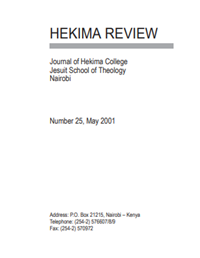
Hekima Review No. 25 (May 2001)
Hekima Review therefore continues to reflect our wholehearted engagement in critical theological reflections on the problems that plague our continent from within and without. Through this apostolic labour, fresh waters have recently passed under the bridge of theology here. The articles in this issue of Hekima Review are freshening waters from beneath this bridge of theology
-
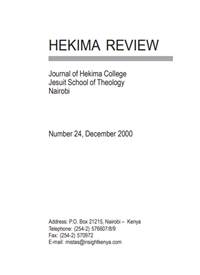
Hekima Review No. 24 (Dec 2000)
January 1999, James D. Wolfenson, head of the World Bank, proposed to the Board, Management, and Staff of the W.B., for a comprehensive development framework. In September 2000, the proposal was carried on in the W.B.’s World Development Report. The move obviously stems from the recognition of the failure of the Structural Adjustment Program. For more than two decades indeed, the Bank had claimed that there was a necessary link between the implementation of the SAP and the reduction of poverty. But, as Wolfenson’s proposal pointed out, despite the commitment of the institution to the ‘betterment of mankind and (the) improvement in the life of many in poverty… progress is slow’- if at all there is any 2.8 billion people, almost half of the population of the World, live on less than $ 2 a day. Of these 2.8 billion, 1.2 billion live on less than $1 a day. The figure has increased compared to the 1,183 million of 1987. In poorer countries (most of them in Africa), as many as 50 percent of the children suffer from malnutrition.
-
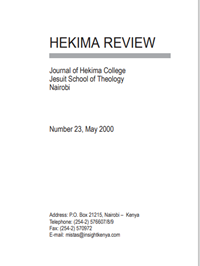
Hekima Review No. 23 (May 2000)
The last ten years have seen a new paradigm emerge from theological discourses in Africa: the paradigm of reconstruction. A theology of the reconstruction of Africa, essentially carried out by Protestant theologians, is trying to take shape. Ka Mana, Mugambi, Karamaga, and Mulunda-Nyanga, to name but few, have each dedicated scholarly works to what they consider to be the primordial challenge of the continent. Ka Mana, for instance, argues that the religious and socio-political environment of the
continent has significantly changed. Christian theologies no longer have the monopoly of theological discourse. The political ideologies, which sustained the freedom fighters and brought about independence are slowly dying, thus leaving a more serene landscape. Africans are nowadays concerned with democracy, freedom, human rights, and wars…They dream of a new Africa. All these, Ka Mana claims, summon us to renew our way of doing theology in Africa. -
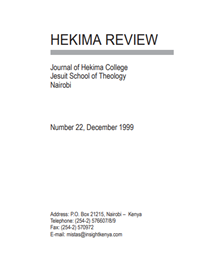
Hekima Review No. 22 (Dec 1999)
Suffer me yet just one more liberty at the close of this millennium, for moments of pain are packed with poetry. While mourning the death of Mwalimu Julius Kambarage Nyerere, is not the parallel of Moses both spontaneous and poignant? Like Moses, Mwalimu had a vision arising from, yet more durable than, the suffering around him. Like Moses, he dared to begin to effect it. Indeed many countries in the sub-region of East, Central, and Southern Africa owe their liberation from the yoke of colonialism, racism, and dictatorship to the vision of Mwalimu Nyerere. Where his material resources could not be reached, Mwalimu Nyerere lent a voice: he articulated the concerns of voiceless peoples and nations against domineering powers of subjugation and marginalization. And that little voice from that discreet figure was hard to ignore

